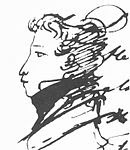Aleksandr Puszkin, ojca współczesnej poezji rosyjskiej
(1) malarstwo Wasilij Tropinin (1827)
Aleksandr Siergiejewicz Puszkin (Александр Сергеевич
Пушкин) urodził się w Moskwie w dniu 26 maja 1799 roku, zmarł w Petersburgu w
dniu 29 stycznia 1837. Był poetą, dramaturgiem i rosyjski pisarz, twórca
współczesnej literaturze rosyjskiej. Jego praca jest objęta ruchu
romantycznego.
Puszkin stworzył styl narracji, mieszając dramat,
romans i satyrę, używając języka rosyjskiego i znacznie wpłynęły kolejne
postacie literackie, takie jak Dostojewski, Gogol, Tiutczewa i Tołstoja.
(2)
Aleksandra Puszkina (1827), grana przez Orest Kiprenski.Galería Tretjakowa,
Moskwa.
Był
potomkiem jednej z najstarszych rodzin arystokracji rosyjskiej, którego
historia sięga XII wieku. Jego babka ze strony matki i jego pielęgniarką, chłop
pokorny, dla którego czuł ogromne nabożeństwo do końca życia, zaszczepił w nim
głęboką miłość do rosyjskich bajek ludowych i poezji; tworzył niezwykłe,
ponieważ jego rodzina szlachecka w języku francuskim mówiono. Puszkin otrzymał
staranne wykształcenie literackie na podstawie literatury i języka francuskiego.
Zapalonym czytelnikiem od dzieciństwa, zdumiał się łatwością improwizować
imitacje swoich nauczycieli, Moliera, Woltera i Evariste parny francuskim i
angielskim Szekspira i Byrona.
(3)
Aleksandr Puszkin w wieku 14 lat przed recytując wiersz Derzhavin w
Imperial Liceum w Carskim Siole. Box Ilya Repin (1911).
W latach
1811 i 1817 badania w Imperial Liceum w Carskim Siole później -called
"Liceum Puszkina" na jego cześć-koło Petersburga, gdzie rozpoczął
pisząc swój wiersz Rusłan i Ludmiła, opublikowanej w 1820 roku wśród wielu
kontrowersji nad emisją i stylu , W tym wierszu mu odłożyć poetyckie kanonów
neoklasycyzmu, została okrzyknięta przez czytelników i stopniowo zyskał
poparcie weteranów poetów.
W 1820
roku rozpoczął pracę w Ministerstwie Spraw Zagranicznych i stopniowo
zaangażowanych w ruchach reformatorskich społecznego, stając się rzecznikiem
radykalnych pisarzy pisać wiersze jak Oda do wolności, więc car Aleksander I
prawie wygnał go na Syberię ; ale ochraniacze i wielbiciele osiągnąć lżejszą
karę.
(4)
Pożegnanie Puszkina do morza. Box Iwan Ajwazowski i Ilja Repin (1877).
Krajobrazy
i ludzi z Kaukazu wrażeniem poetę; tak pisał romantyczny wiersz Captive
Kaukazu, między 1820 i 1821. Pisał wiersze Gabrielada (1821), bandyci Brothers
(1822), źródło Bakczysaraj (1823) oraz wiersze złote. W 1823 roku rozpoczęto
prace szczytu powieść werset Eugeniusz Oniegin. W 1825 roku napisał dramat
historyczny Borys Godunow, liczba Nulin (1825) i Roma (1827).
Po
powrocie do Moskwy w 1830 roku poznał Natalia Gonczarowa, jedną z
najpiękniejszych kobiet swoich czasów. Odszedł do posiadłości ojca w Boldino,
Niżny Nowogród. Pisał historię wsi Goriújino małe tragedie - Mozart i Salieri,
The skąpy Rycerz, The Stone Guest (cover Don Juan) i inne prace. Ożenił Natalia
Gonczarowa w 1831 roku; że dołączył do Ministerstwa Spraw Zagranicznych Spraw
Zagranicznych ze szczególnym wynagrodzenia 5000 rubli.
(5)
Natalia Gonczarowa (Pushkina), portret Aleksandr Briullov (1822/77).
Puszkin
miał wiele wydatków (nowe dziecko co roku, dwie niezamężne siostry żony mieszka
z nim, jego hazardu, częstych i kosztownych stron, bale i przyjęcia, że jego
żona była zajęta); więc nawet z nieustannej pracy literackiej i wspaniałego
wynagrodzenia, zgromadził ogromne długi. W 1836 roku opublikował dziennik
literacki magazyn Współczesna nabędzie maksymalny prestiż w rosyjskich liter.
Ale
zazdrość czai i 27 stycznia 1837, w wieku 37, Puszkin jest śmiertelnie ranny w
pojedynku z francuskim oficerem Georges d'Anthes, chronione i tajne miłośnik
ambasadorem holenderskiej, jeden na przedmieściach Petersburga , Poradzili
sobie broń, dlatego, że poeta nie mógł się bronić, a pierwszy pocisk uderzył go
wbrew pistoletu w pierś, aby rozpocząć mecz, umiera bez lekarzy nie mógł zrobić
nic, rano w dniu 29 stycznia 1837 r. wielka strata dla literatury rosyjskiej i
światowej.
The
Flower (1828)
The flower, very
dry and scentless,
I see in the
forgotten book;
And now, with the
strangest fancies,
Is filled my
soul’s every nook.
Where and in which
spring was it grown?
And how long? By
whom was cut?
By a hand known or
unknown?
And why was put
this page behind?
To the recall of
the love-talking,
Or separation
forced by fate,
Or quiet and alone
walking
In the fields’
silence and woods’ shade?
Is he alive? And
his sweet lady?
And where is now
their little nook?
Or maybe they had
both faded,
Like this strange
flower in this book?
W Jewgienija Bonver, 10 listopada 2003
W
fragmentów wideo z życia Puszkina są.
Referencje
Aleksandr Pushkin
Aleksandr Pushkin
Aleksandr Pushkin, The Flower, poema de 1828















